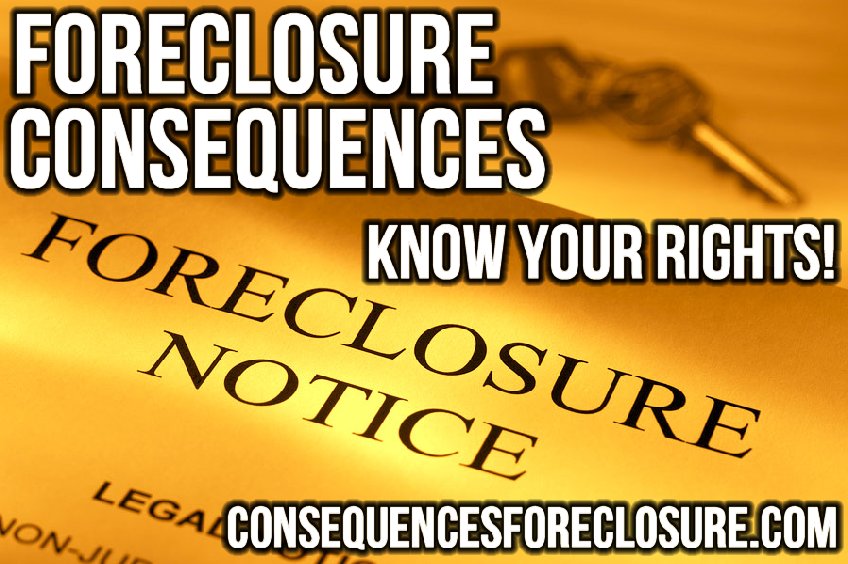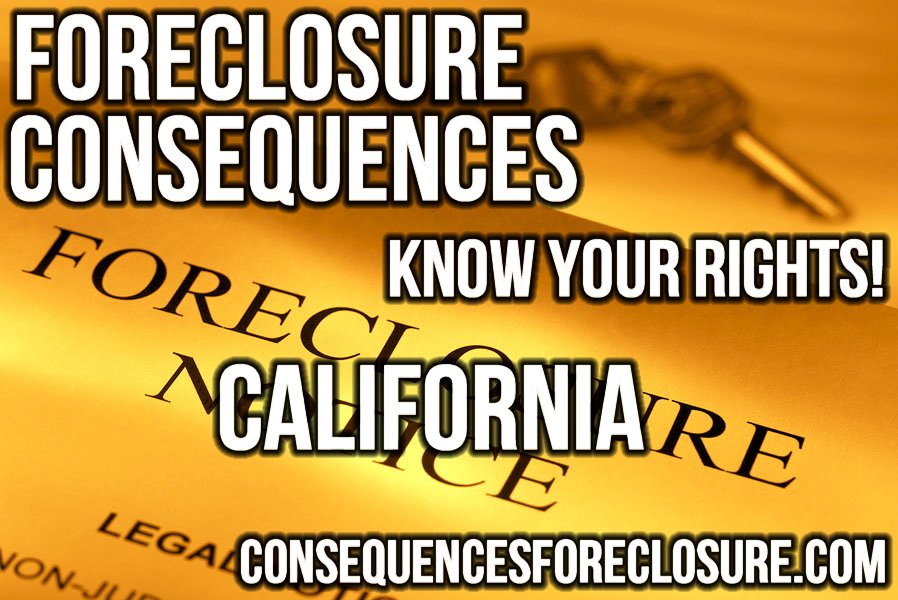 Foreclosure Consequences - Consequences of Foreclosure
Foreclosure Consequences - Consequences of Foreclosure
Foreclosure Consequences in California: CA

Foreclosure Summary copyright, © ForeclosureLaw.org
Quick Facts
Judicial Foreclosure Available: Yes
Non-Judicial Foreclosure Available: Yes
Primary Security Instruments: Deed of Trust, Mortgage
Timeline: Typically 120 days
Right of Redemption: Varies
Deficiency Judgments Allowed: Varies In California, lenders may foreclose on deeds of trusts or mortgages in default using either a judicial or non-judicial foreclosure process.
Judicial Foreclosure
The judicial process of foreclosure, which involves filing a lawsuit to obtain a court order to foreclose, is used when no power of sale is present in the mortgage or deed of trust. Generally, after the court declares a foreclosure, your home will be auctioned off to the highest bidder.
Using this type of foreclosure process, lenders may seek a deficiency judgment and under certain circumstances, the borrower may have up to one (1) year to redeem the property.
Non-Judicial Foreclosure
The non-judicial process of foreclosure is used when a power of sale clause exists in a mortgage or deed of trust. A "power of sale" clause is the clause in a deed of trust or mortgage, in which the borrower pre-authorizes the sale of property to pay off the balance on a loan in the event of their default. In deeds of trust or mortgages where a power of sale exists, the power given to the lender to sell the property may be executed by the lender or their representative, typically referred to as the trustee. Regulations for this type of foreclosure process are outlined below in the "Power of Sale Foreclosure Guidelines".
Power of Sale Foreclosure Guidelines
If the deed of trust or mortgage contains a power of sale clause and specifies the time, place and terms of sale, then the specified procedure must be followed. Otherwise, the non-judicial power of sale foreclosure is carried out as follows:
A notice of sale must be: 1) recorded in the county where the property is located at least fourteen (14) days prior to the sale; 2) mailed by certified, return receipt requested, to the borrower at least twenty (20) days before the sale; 3) posted on the property itself at least twenty (20) days before the sale; and 4) posted in one (1) public place in the county where the property is to be sold.
The notice of sale must contain the time and location of the foreclosure sale, as well as the property address, the trustee's name, address and phone number and a statement that the property will be sold at auction.
The borrower has up until five days before the foreclosure sale to cure the default and stop the process.
The sale may be held on any business day between the hours of 9:00 am and 5:00 pm and must take place at the location specified in the notice of sale. The trustee may require proof of the bidder’s ability to pay their full bid amount. Anyone may bid at the sale, which must be made at public auction to the highest bidder. If necessary, the sale may be postponed by announcement at the time and location of the original foreclosure sale.
Lenders may not seek a deficiency judgment after a non-judicial foreclosure sale and the borrower has no rights of redemption.
More information on California foreclosure laws
Learn all about foreclosure consequences in Alabama: AL, foreclosure consequences in Alaska: AK, foreclosure consequences in Arizona: AZ, foreclosure consequences in Arkansas: AR, foreclosure consequences in California: CA, foreclosure consequences in Colorado: CO, foreclosure consequences in Connecticut: CT, foreclosure consequences in Delaware: DE, foreclosure consequences in Florida: FL, foreclosure consequences in Georgia: GA, foreclosure consequences in Hawaii: HI, foreclosure consequences in Idaho: ID, foreclosure consequences in Illinois: IL, foreclosure consequences in Indiana: IN, foreclosure consequences in Iowa: IA, foreclosure consequences in Kansas: KS, foreclosure consequences in Kentucky: KY, foreclosure consequences in Louisiana: LA, foreclosure consequences in Maine: ME, foreclosure consequences in Maryland: MD, foreclosure consequences in Massachusetts: MA, foreclosure consequences in Michigan: MI, foreclosure consequences in Minnesota: MN, foreclosure consequences in Mississippi: MS, foreclosure consequences in Missouri: MO, foreclosure consequences in Montana: MT, foreclosure consequences in Nebraska: NE, foreclosure consequences in Nevada: NV, foreclosure consequences in New Hampshire: NH, foreclosure consequences in New Jersey: NJ, foreclosure consequences in New Mexico: NM, foreclosure consequences in New York: NY, foreclosure consequences in North Carolina: NC, foreclosure consequences in North Dakota: ND, foreclosure consequences in Ohio: OH, foreclosure consequences in Oklahoma: OK, foreclosure consequences in Oregon: OR, foreclosure consequences in Pennsylvania: PA, foreclosure consequences in Rhode Island: RI, foreclosure consequences in South Carolina: SC, foreclosure consequences in South Dakota: SD, foreclosure consequences in Tennessee: TN, foreclosure consequences in Texas: TX, foreclosure consequences in Utah: UT, foreclosure consequences in Vermont: VT, foreclosure consequences in Virginia: VA, foreclosure consequences in Washington: WA, foreclosure consequences in Washington, DC; foreclosure consequences in West Virginia: WV, foreclosure consequences in Wisconsin: WI, foreclosure consequences in Wyoming: WY